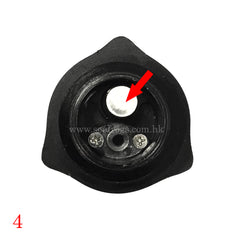WARNING - THIS ACCESSORY IS NOT MEANT TO BE USED UNDERWATER AS PER MANUFACTURER INSTRUCTIONS! ANY ATTEMPT TO DO SO CAN CAUSE EQUIPMENT LOSS AND IS NOT COVERED BY THE WARRANTY!
Compatible models of underwater camera housings:
Included
- Electronic valve
- Pump
- Screwdriver (for battery replacement)
The vacuum pump system is used for checking the water tightness of underwater camera housing before submerging.





Install the camera inside underwater camera housing in a dry and low humidity level place.
15-30 minutes before your dive remove the lid from the backplate to access the vacuum pump system opening (Illustration 1) and make sure the O-ring stays in place. Attach a vacuum pump system to the opening by screwing it clockwise (Illustration 2). Unscrew the lid of the electronic valve (Illustration 3) and press the button to turn on the LED inside the valve (Illustration 4). Attach the rubber part of a pump to the valve and start pumping air out (Illustration 5). Red LED starts blinking, indicating ambient atmospheric pressure. The hand pump is fitted to the threaded valve body and the air is pumped out of a unit until the red LED changes to green LED and add couple more strokes to make sure the sufficient underpressure. The additional stroke or two ensures that the valve is not on the edge of the threshold. The pump is then removed, and the protective cap is replaced to ensure airtightness. Observe the green LED blinking for 15 minutes to make sure there is no air leakage. Unscrew the lid of a valve to access the button and press it for a few seconds to release the pressure from inside and turn the valve LED off (Illustration 4). Remove the valve from the backplate and place the vacuum opening lid in its original place, make sure the O-ring is still there (Illustration 1). - safe to dive!